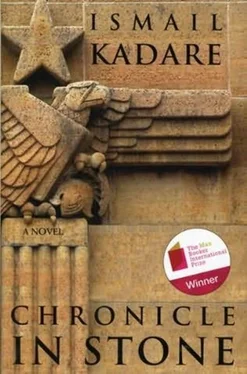Ismaíl Kadaré - Chronicle in Stone
Здесь есть возможность читать онлайн «Ismaíl Kadaré - Chronicle in Stone» весь текст электронной книги совершенно бесплатно (целиком полную версию без сокращений). В некоторых случаях можно слушать аудио, скачать через торрент в формате fb2 и присутствует краткое содержание. Жанр: Современная проза, на английском языке. Описание произведения, (предисловие) а так же отзывы посетителей доступны на портале библиотеки ЛибКат.
- Название:Chronicle in Stone
- Автор:
- Жанр:
- Год:неизвестен
- ISBN:нет данных
- Рейтинг книги:4 / 5. Голосов: 1
-
Избранное:Добавить в избранное
- Отзывы:
-
Ваша оценка:
- 80
- 1
- 2
- 3
- 4
- 5
Chronicle in Stone: краткое содержание, описание и аннотация
Предлагаем к чтению аннотацию, описание, краткое содержание или предисловие (зависит от того, что написал сам автор книги «Chronicle in Stone»). Если вы не нашли необходимую информацию о книге — напишите в комментариях, мы постараемся отыскать её.
Chronicle in Stone — читать онлайн бесплатно полную книгу (весь текст) целиком
Ниже представлен текст книги, разбитый по страницам. Система сохранения места последней прочитанной страницы, позволяет с удобством читать онлайн бесплатно книгу «Chronicle in Stone», без необходимости каждый раз заново искать на чём Вы остановились. Поставьте закладку, и сможете в любой момент перейти на страницу, на которой закончили чтение.
Интервал:
Закладка:
“Nations? Like on the postage stamps, you mean?”
“Right. Like that. Nations.”
“Who’s going to slaughter them?”
Ilir shrugged. “I didn’t ask.”
I thought about the slaughterhouse again. One day when she was talking about the aerodrome Xhexho said that the fields and grasses would be covered with cement. With wet slippery cement. A rubber hose sluicing cities and nations. To wash away the blood… Maybe we were only at the beginning of the slaughter. But I found it hard to imagine nations being led to the slaughter, bleating as they went. Peasants in their black woollen cloaks. Butchers in white coats. Rams, ewes, lambs. People standing around to watch. Other people just waiting. Then it was time. France. Norway. The square awash with blood. Holland bleating. Luxembourg like a newborn lamb. Russia with a big bell around its neck. Italy a goat (I don’t know why). Something mooing all on its own. Who could that be?
“Well, what do you hear about this house they’re all talking about?” Ilir asked.
“I heard it’s bad. Very bad.”
“You know what? They say it’s full of beautiful young girls.”
“Really? Xhexho says they’re bad women.”
“But beautiful.”
“Beautiful? You’re crazy.”
“You’re the one who’s crazy!”
Both of us shut up for a while.
Meanwhile the bordello had set the whole town abuzz. Xhexho swept in and out of our house several times a day, bringing the most incredible news. The wind blew constantly. There had not been such powerful gusts of wind for decades. They said that old Xivo Gavo had decided to mention the windstorm in his chronicle.
Around that time they had the first air-raid siren tests. At noon there came a wail that froze the marrow of our bones.
“That must be Bido Sherifi’s mother-in-law,” Grandmother said. “Nobody else can shriek like that.”
Papa and Mamma leaned on the windowsill. The wailing continued, but it was no human cry. It came in waves, seemed to fade away and then suddenly rose again, rending the heavens with yet more power. Not even a hundred of Bido Sherifi’s mothers-in-law could have made such a sound.
“It’s a siren,” my father said bleakly. “I heard one once in Egypt.”
Grandmother was dumbfounded.
So it was that the city came to have a siren.
“Now we have a mourner who will wail for us all,” said Xhexho, who had come to visit that afternoon. “That’s all we needed, Selfixhe. All we have to do now is wait for the archangel to gather up our souls.”
As if all this were not enough, something else happened that shook even those who had kept calm until then. Argjir Argjiri got married.
I had noticed that announcements of engagements or weddings sometimes surprised people, making some happy and bringing smiles to others. But I never thought the news of a wedding could be seen by everyone, without exception, as a major catastrophe. Have you heard? Argjir Argjiri is getting married. You’re kidding! No, really, it’s true. Don’t talk nonsense. Argjir Argjiri getting married? How? Well, he is. Come on! It’s impossible. No it isn’t. Kako Pino has even been summoned to paint the bride. No, it’s unbelievable. It can’t be. But I heard the same thing. It’s true then? Yes, it’s true. God, what an abomination. How shameful!
Argjir Argjiri was a short dark man with a voice so high-pitched he sounded like a woman. Everyone knew him, he roamed around in all the neighbourhoods. People said he was half-woman and half-man, and he was the only male, or supposed male, who came and went freely in every house even when the men weren’t home. Argjir helped the women with various household chores, looked after the children when the women were at the wash-house, went to fetch water with them and retailed gossip. He had a house of his own, and people said that he helped women not because he had to but because he liked their company and women’s work. This was after all not so strange, given that Argjir Argjiri was half-man and half-woman. Although for years he had been the butt of jokes and the object of jeers, by way of compensation he had won a right enjoyed by no other man: he could mingle freely with our city’s women and girls.
And now suddenly Argjir Argjiri announced that he was getting married. It was a terrible act of defiance.
The creature with the effeminate voice suddenly declared his manhood. For years he had borne the most biting taunts, awaiting his hour of revenge. The city scowled at such an intolerable outrage. There wasn’t a single home Argjir Argjiri had not entered, not a single woman he didn’t know. Dark suspicion stalked the town.
Hopes that the reports were false soon evaporated. Kako Pino was summoned. An orchestra was hired, the wedding date was set. Hopes that Argjir Argjiri would change his mind likewise dwindled. Even repeated threats, so rumours said, had no effect. He remained adamant. More pressure was put on him, but he stood his ground. It was all done very discreetly, through clenched teeth and in anonymous letters. No one wanted to lead the campaign against Argjir Argjiri openly, for fear of seeming to have a personal axe to grind.
No one ever found out why the man with the treble voice suddenly rebelled. What had happened to him? Why was he doing it? That’s right, why? At last the wedding night arrived. The city was under curfew. The wind that had been blowing for two weeks suddenly stopped. The silence seemed deeper after its incessant whistling. The eye of the searchlight blinked, then went out. The wedding drums rolled as if tolling the death of the city’s honour.
“The cup runneth over,” Xhexho commented bitterly. Now, she said, we could expect the springs to gush black water.
“That’s all we needed,” Isa said to Javer as he smoked in the dark. “The marriage of that hermaphrodite.”
“Things are all adrift,” Javer answered. “This town is going to wind up like Sodom and Gomorrah.”
The attack was swift and merciless. The siren failed to give a warning in time. The city was gripped by convulsions, like an epileptic. It pitched over, nearly fell. It was a Sunday, nine in the morning. On that October day near mid-century, the ancient city, pounded countless times through the ages by catapult and cannon, shell and battering ram, was attacked from the sky for the first time. Broken foundations groaned with pain like blinded men. Thousands of terrified windows spewed their shattered panes.
After the infernal thundering, the world went deaf and dumb. The distraught city gazed up at a clear sky, which seemed to beg forgiveness for having stood by and watched. The three tiny silver crosses that had shaken that immense mass of stone to its foundations were now moving off into the distance.
The bombing left sixty-two dead. Granny Neslihan was found in the rubble, buried up to her waist. She didn’t understand what had happened to her. Waving her long arms in the air, she cried, “Who killed me?” She was 142 years old. And blind.
FRAGMENT OF A CHRONICLE
Prepare for an air raid. Build yourself a shelter to protect you and yours from the British bombs. Have sandbags ready and store water in the house. Get a hatchet, a shovel and a pickaxe to fight fire. City hall. Trial. Executive measures. Property. Trials are suspended until further notice. Our fellow townsman Argjir Argjiri was found dead in the bridal chamber the morning after his ill-fated marriage. The city could not forgive the man who had so disgraced it. Dr S. Çuberi. Venereal diseases. Daily from four to eight p.m. List of casualties of the latest
SEVEN
The city was bombed every day that week. Everything else was forgotten. No one talked of anything but bombs and planes. Hardly a word was even said about the death of Argjir Argjiri, who was found murdered at dawn, just a few hours after his wedding. His killers, like the authors of the threatening letters, were never identified.
Читать дальшеИнтервал:
Закладка:
Похожие книги на «Chronicle in Stone»
Представляем Вашему вниманию похожие книги на «Chronicle in Stone» списком для выбора. Мы отобрали схожую по названию и смыслу литературу в надежде предоставить читателям больше вариантов отыскать новые, интересные, ещё непрочитанные произведения.
Обсуждение, отзывы о книге «Chronicle in Stone» и просто собственные мнения читателей. Оставьте ваши комментарии, напишите, что Вы думаете о произведении, его смысле или главных героях. Укажите что конкретно понравилось, а что нет, и почему Вы так считаете.












